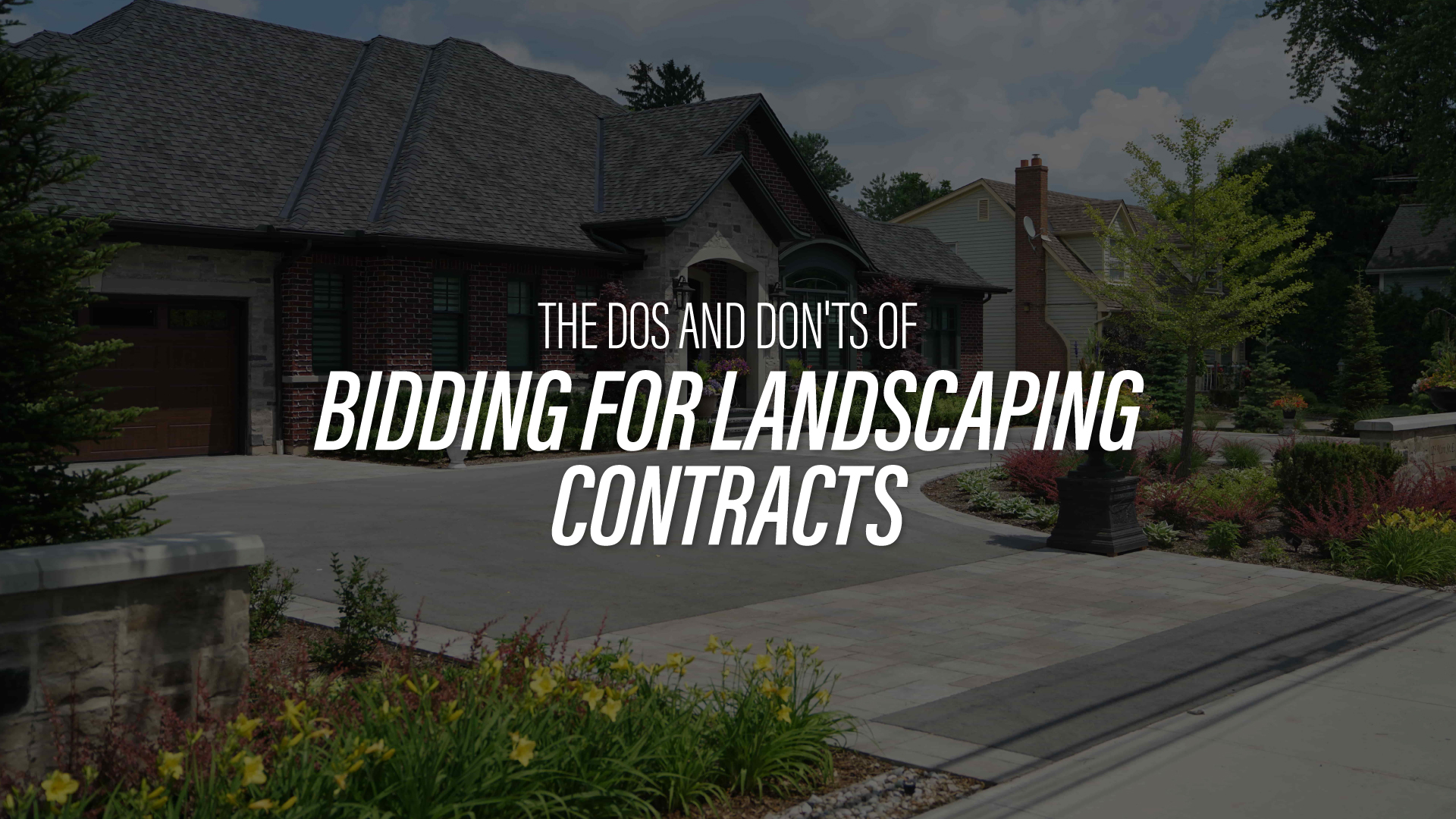Whether you’re looking to transition into commercial landscaping, or are simply ready to increase your volume, honing your strategy for how to get commercial landscaping contracts is a surefire way to build up your business. By following the right steps, you can consistently submit competitive bids and increase your chances of success.
Bidding for landscaping contracts is an important but often overlooked component of the landscaping industry. Putting time and effort into scaling your business by purchasing commercial equipment and assembling a skilled team will be in vain if you can’t secure commercial contracts.
While there are entire courses dedicated to bidding and estimating, we’ll cut straight to the chase and share actionable best practices on how to get landscape contracts. Follow this guide to learn more about bid research, formatting, selling points, and presentation methods— then start winning those contracts!
Dos of Bidding for Landscaping Contracts
Here are some tips on how to get commercial landscaping contracts that will put you ahead of the curve and help you stay competitive.
Research the client and their requirements
The most important step before you bid is to thoroughly research the client and their needs. This means doing your homework on the company, its team members, and the project itself. Look for any potential opportunities or unique features that make you a good fit for the job. Leverage those as selling points in your proposal.
Uncover as much information about the project as possible by talking with people who have worked on similar projects. Ask questions about the scope of work, timeline, budget, and anything else you can think of. Doing your research first will help you create an accurate bid that meets the client’s needs and stands out from the competition with attention to detail.
Put together a comprehensive bid
Once you’ve identified the client’s needs, the next step to winning commercial landscaping contracts is to put together a comprehensive bid. This includes quantifying services and materials required, estimated labor costs, total project cost, and timeline. Make sure your pricing reflects the value you bring to the job and do not underestimate or overestimate any aspect of the project.
Include any relevant certifications, qualifications, and experience to showcase your team’s expertise. This will help establish trust with the client and can be the deciding factor in why they choose you over another bidder.
Strategic bidders include alternates and upgrades in a bid package as well. This allows clients to envision customizing their project and helps them know what to expect if they need to make changes down the line. For example, if a commercial landscaping project calls for a certain type of grass seed, provide a few different options at varying prices so the client can choose what works best for them.
When we say comprehensive, we mean it. What’s left unaccounted for can come back to haunt you. Don’t forget about the cost of subcontractors or any additional services you may need (e.g., permit fees, soil testing, etc.). Once your bid has been selected, you’re on the hook for completing the job at the price listed. If you realize that you forget to factor in something, you’ll have to eat the cost or risk alienating the client.
Highlight your unique selling points
Bidding for commercial landscaping contracts doesn’t have to be impersonal. Clients want to know why they should choose your company over the competition. In addition to competitive pricing, highlight your unique selling points in the bid. Does your team have specialized experience with a certain type of landscaping project? Are you local and able to provide quick response times?
Think about what sets you apart from others and jot that down in the bid. Having unique selling points will help you stand out and increase your chances of winning the contract.
Create a detailed timeline
Create a timeline for the project that includes both your goals and those of the client. Estimate how long each phase of the job will take and make sure to account for any delays or complications that may arise. This helps the client understand when they can expect to see results, builds trust, and shows them you are organized.
A commercial landscaping bid timeline typically includes:
- Pre-construction planning and consultation
- Project site preparation with grading, drainage installation, etc.
- Installation of materials such as turf, trees, shrubs, irrigation systems, etc.
- Post-construction clean-up and final walk-throughs
Present your bid professionally
Presenting your bid professionally is the final step in getting commercial landscaping contracts. Create a simple, easy-to-read document that includes all of the details mentioned above. Include visuals like drawings and photos if they help explain the scope of work or highlight unique features you’re offering.
Make sure to check for typos and ensure any terms and conditions are accurate before submitting the bid. It also helps to put yourself in the client’s shoes and think through how they will perceive your pitch – you want them to come away impressed with your work.
To showcase your bid, we recommend using software such as Adobe InDesign, Canva, or Proposal Software to create a great-looking document quickly.
Follow up after submitting your bid
A simple call or email can make all the difference in getting commercial landscaping contracts. Seal the deal by following up with the client and clarifying any points of confusion. Address their needs, answer any questions they may have, and give them a reason to choose your proposal over another.
Be proactive in letting the client know you are available for further discussions if needed. This could be the deciding factor that gets you the job!
Don’ts of Bidding for Landscaping Contracts
Now that we’ve covered the essentials for how to get landscape contracts, let’s review what you should definitely avoid. Make any of these common mistakes and your bid could be dead on arrival.
Undervalue your services
It’s important to set a competitive rate for your services, but don’t undervalue your worth. Lowballing the bid may seem like a surefire way to get the job, but it will eat into your profits.
Undervaluing yourself also takes away from the value of the bid. It’s better to set a fair price and demonstrate the quality of your work than to submit an unrealistically low bid that no one takes seriously.
Submit a generic bid
Bidding for commercial landscaping contracts is a competitive process that requires you to tailor your proposal to the specific needs of the client. Submitting generic bids with no personalization or customization shows that you haven’t put in any effort, and it’s unlikely to result in a job offer.
Ignore important details in the bid request
The bid request is your roadmap for how to get landscape contracts. Take the time to read through it and highlight any important details that you should include in the proposal. Failing to address any of these points in your bid can lead to confusion or even disqualification if you don’t meet the criteria outlined in the document. It’s best to have two sets of eyes review the bid to make sure it addresses all aspects of the bid request before submitting it.
Miss the bid deadline
Commercial contracts are sticklers for deadlines, so make sure you submit your bid on time. Missing the deadline by even a few minutes can result in your bid being disqualified. Set yourself a reminder ahead of the due date to make sure you don’t forget and miss out on an opportunity!
Neglect to consider the competition
Remember, you’re not the only one gunning for commercial landscaping contracts. Take the time to research your local competition. Find out what they’re offering so you can make sure your bid stands out from the pack. Don’t name-drop on your bid, i.e. “We offer more X than Company Z.” But you can subtly point out the advantages that your services have over others.
Fail to consider the financial implications of the bid
Before submitting a bid, do your due diligence and make sure you can financially afford to take on the job. You don’t want to be stuck in a contract that you can’t deliver or end up losing money because of unforeseen circumstances. Go over all of the terms and conditions carefully and factor in any additional costs that may arise, such as travel or staffing. Overpromising or under-delivering on a bid can seriously hurt your company’s reputation in the long run.
Elevate Commercial Landscaping Contracts
Follow our clear-cut guide of dos and don’ts on how to get landscape contracts to help you submit winning bids and increase your chances of securing contracts. With the right strategy and a bit of luck, you’ll be on your way to success in no time!
Bidding for commercial landscaping projects doesn’t have to be daunting. With premier landscape management software, LMN, you can build a better financial plan and estimate more projects accurately. Stop handwriting and crunching numbers. Simplify your workflow and maximize efficiency with LMN’s easy-to-use platform. LMN also includes industry benchmarks to help you make better decisions. See a live demo here!
Questions? We have Answers.
A commercial lawn care contract should include a header, the scope of services, the duration, pricing and payment terms, insurance and liability, client responsibilities, and the governing law and signatures. These are just general guidelines, so it’s best to consult an attorney. You want to make sure your contract complies with all laws and regulations.
When you’re writing a landscaping contract agreement, make sure you clearly outline terms and conditions. The contract should also include a scope of work, a schedule, payment terms, permits and approvals, etc. As always, make sure you consult an attorney to make sure you’re contract complies with all local laws and regulations.
A marketing strategy can help you get new landscaping clients. Start by identifying your ideal client. What do they like to do, where do they spend their time, and what is important to them? Next, craft a strategy to reach them. Are they on social media, are they likely to ask neighbors for recommendations? Once you understand your prospects’ pain points and what influences them, you’ll be well on your way to bringing new leads into your sales funnel.
A landscaping contract should include a set of mandatories like pricing terms and conditions, a termination clause and a schedule. However, make sure you research what is legally required in your state or local area. It’s always a good idea to consult legal counsel to make sure you’re not missing anything.
Have additional questions?
Chat with us live during business hours or contact sales.




